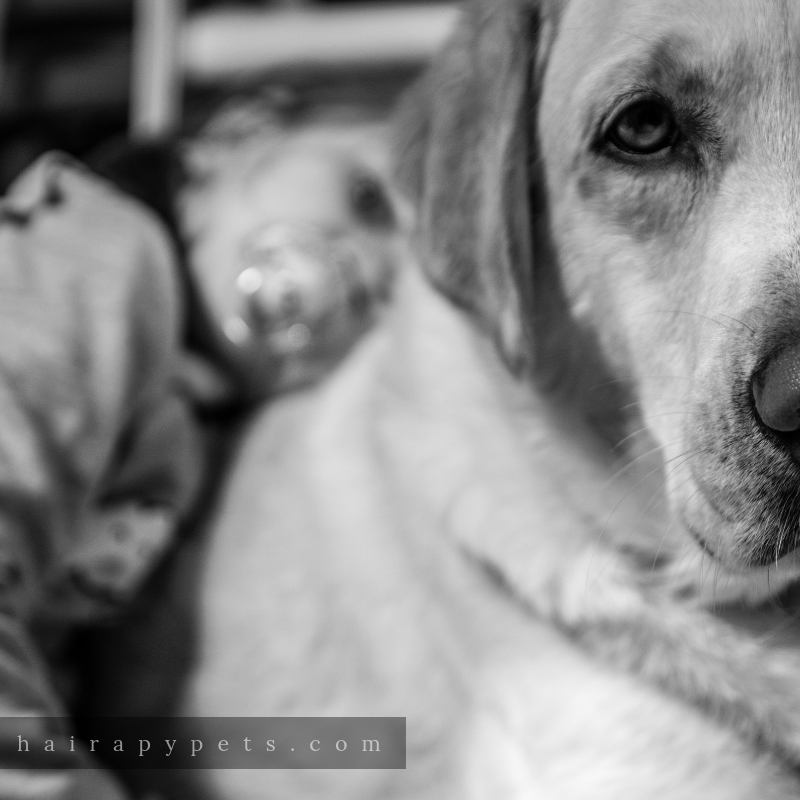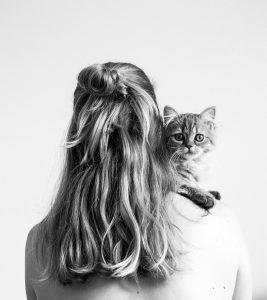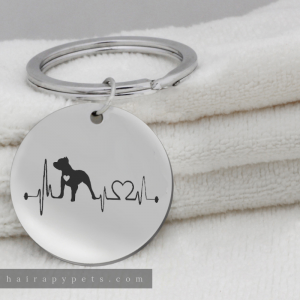
Help! I need to see my hairapist.
Heading out of town on a road trip this past Thanksgiving I could already feel it – the excitement of getting away into a new town for a few days to spend cherished time with family was slightly overshadowed by the familiar sadness, worry, and guilt of leaving my cat behind by himself for a few days. That empty feeling of not having him with me had already began creeping in, along with the concern for his well-being. Yes, there would be someone I trust checking in and caring for him daily, but his typical routine would be shaken. He would not have the comfort of sleeping next to me the next few nights, or the security of his punctual wet food meals each a.m and p.m., or someone to entertain and keep him company. It’s good for him, I tell myself.
The rational side of my brain knows it’s unhealthy for anyone, animal or human, to be one hundred percent dependent on anyone all the time. Animals aren’t completely helpless. And I’m fully aware that if my pet were the reason I did not carry on with life and spend quality time with loved ones, a serious intervention would be necessary. In fact, I would probably be the one to call the intervention for myself. But the emotional part of my brain feels like I’m failing him in a sense. I know that I cannot tell him I’ll be back soon or text him while I’m gone. He will most likely feel abandoned and confused when he meows throughout the house only to receive silence. Wow, I wonder how I’d be as a mom of an actual child. Stop it, he’s a cat. Am I crazy? Quit judging yourself. The familiar inner battle I experience each vacation is similar every time.

I continue driving down the highway. Suddenly I feel my heart swell with love, almost to the point it hurts, as the last vision of him when I said ‘bye for now’ and walked out flashes into my consciousness. I can still see him looking up at me as I hold my bags and quickly kiss his soft, warm forehead. A gentle purr emerges and he flicks the end of his tail in appreciation. His scent resembles a faint mixture of my hand lotion and his cat food. I see his fuzzy gray, brown, and black body nestled up in his favorite plush, white blanket at the foot of my bed. The rising sun is glowing through the window onto his fur, softly outlining his body. I intentionally and slowly blink at him to speak the language of his species. Love you, little guy. See you soon. He flicks his tail again and mirrors my gesture back to me, slowly blinking at me while holding eye contact – the classic “cat smile.” I completely melt. This is the meaning of life, I hear myself think. These subtle yet profound moments that not everyone catches. I refuse to take them for granted. Especially since tomorrow is never guaranteed.
I’ve often wondered if other people experience the withdrawal symptoms of being away from their pet for a few days. I can’t be the only one. But in my experience, no one really talks about this. So either I’m a rare breed, or it is in fact common but people keep these thoughts to themselves to avoid being scrutinized and judged, especially by the non-pet people. Well, the cat’s out of the bag now for me, isn’t it? There it is, one of my secrets. Judge away. Some may call it obsession. I simply call it love – the real kind. Never let anyone make you feel wrong for having compassion for animals.

If you experience animal withdrawals as well, what does it say about you? Well for one, that you’re human. It seems that human nature is often to cling to what comforts us. Think back to being a young child and remember what you clung to until your parents started weaning you off. For many of us, this was a special blanket or stuffed animal that we felt an extreme sentimental attachment to. Perhaps we never completely lose this trait, and there could possibly be biological reasons for this which I won’t delve into here. For many, animals are that roll for us. And since our pets are mostly associated with positive emotions and the comfort of our homes, it isn’t completely crazy. Although it is sometimes necessary to take short breaks from our pets’ less appealing behavior, reuniting never fails to provide that endorphin and oxytocin high that I have no doubts is an addiction, hence the reason I consistently reference the term “pet addict.” I may have invented the term, but I certainly did not invent the addiction.
Although I believe pets are mostly therapeutic, the withdrawal-like symptoms experienced when away from your pet for longer than usual can be uncomfortable. However, it is a harmless addiction given the fact that “relapses” show up in forms like becoming overly enthusiastic every time a dog walks by, or overstaying your welcome at Petsmart and refusing to walk away from the kitties in the windows. Sometimes said addict may even pretend to be looking to adopt just so they can touch one. Ahem. Harmless. In other words, pets don’t give us lung cancer or liver disease, therefore I’m okay with it.
While the challenges experienced from pet withdrawals are inevitable, there are ways to manage them – somewhat.
1. Make friends with someone else’s pet while you are out of town.
2. If no one around you has one, take a visit to a pet store, dog park, horse stable, petting zoo, cat café, duck park, goat farm….you get the picture. Anywhere you can get your fix! It’s not only therapeutic for you, but also for the animals. When you have love to give, always share it.
3. Stay busy and distracted. Especially right at bed time which is when the symptoms heighten. Find something to read or watch as you fall asleep to alleviate the withdrawal symptoms.
And that’s the only advice I currently have for filling the void. As more insight is gained, the list will grow. I can say, however, that animal withdrawal symptoms often manifest from anxiety. Here are some tips for managing the anxiety and guilt associated with leaving your pet behind.
4. Having a good pet-sitter you trust helps. If possible, choose one who also has pets. They’ll be more likely to spend time with yours beyond just pouring food and water into the bowls and maybe play and snuggle with them a little. As an additional bonus, they may even text you photos of your pet throughout your trip to assure you everything is fine. This tends to be pet people code for, “I got you.” Leaving a note with feeding, medication, or any other special instructions so you’re not worried about them forgetting something important you said also helps ease the concerns. It’s always better safe than sorry.
5. Leave larger than usual quantities of food and water out even if the pet-sitter is expected to arrive within a day after you leave. This is just back-up in case an emergency prohibits them from tending to your pet as soon as they thought they could. Life happens.
6. Keep a spare key hidden outside in case they misplace the one you gave them, and let them know where it is before you leave.
7. Leave an address and phone number of your vet and the nearest 24-hour pet hospital, along with an emergency credit card. Expect the best but prepare for the worst. You wouldn’t want to leave your pet-sitter in a financial dilemma that could stress them out or jeopardize your pet’s well-being.
Once you arrive home from your trip and determine everything is fine, you are free to make fun of yourself for being the crazy cat girl, bunny man, or dog mom. Own it. Haters will be haters. But at least at your door there is a precious, sweet, loyal creature eager to greet you with wide eyes and a waggy tail. Good boy.
(Featured photo by Panagiotis Karagiannis)

